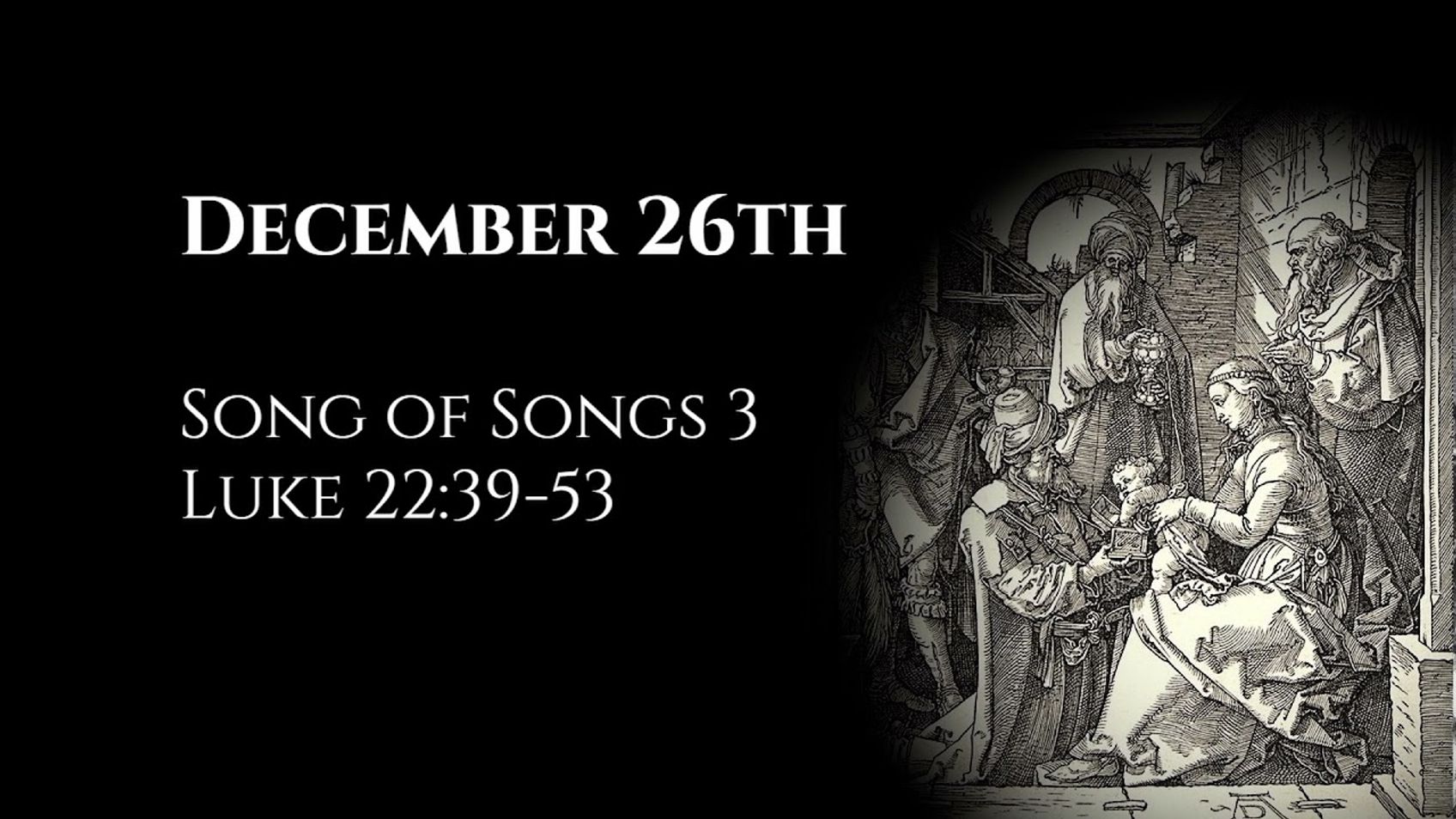December 26th: Song of Songs 3 & Luke 22:39-53
December 25, 2021

Alastair Roberts
Solomon's palanquin coming from the wilderness. Arrest in the Garden of Gethsemane.
My reflections are searchable by Bible chapter here: https://audio.alastairadversaria.com/explore/.
If you are interested in supporting this project, please consider supporting my work on Patreon (https://www.patreon.com/zugzwanged), using my PayPal account (https://bit.ly/2RLaUcB), or buying books for my research on Amazon (https://www.amazon.co.uk/hz/wishlist/ls/36WVSWCK4X33O?ref_=wl_share).
You can also listen to the audio of these episodes on iTunes: https://itunes.apple.com/gb/podcast/alastairs-adversaria/id1416351035?mt=2.
More From Alastair Roberts
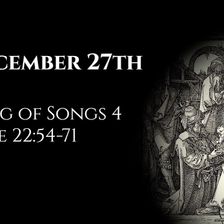
December 27th: Song of Songs 4 & Luke 22:54-71
Alastair Roberts
December 26, 2021
You have captivated my heart, my sister, my bride! Peter's denial.
My reflections are searchable by Bible chapter here: https://audio.alastairadversa
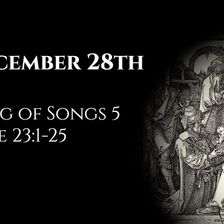
December 28th: Song of Songs 5 & Luke 23:1-25
Alastair Roberts
December 27, 2021
The Bridegroom's unanswered knock at the door. Jesus before Pilate and Herod.
My reflections are searchable by Bible chapter here: https://audio.alas
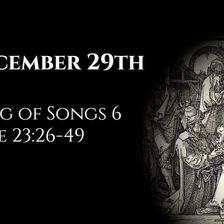
December 29th: Song of Songs 6 & Luke 23:26-49
Alastair Roberts
December 28, 2021
The Bride, awesome as an army with banners. The crucifixion.
My reflections are searchable by Bible chapter here: https://audio.alastairadversaria.co
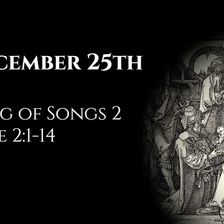
December 25th: Song of Songs 2 & Luke 2:1-14
Alastair Roberts
December 24, 2021
Arise, my love, my beautiful one, and come away! The birth of Jesus Christ.
My reflections are searchable by Bible chapter here: https://audio.alasta
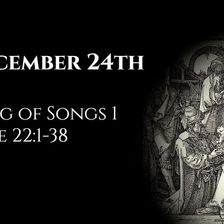
December 24th: Song of Songs 1 & Luke 22:1-38
Alastair Roberts
December 23, 2021
Let him kiss me with the kisses of his mouth! The Last Supper.
My reflections are searchable by Bible chapter here: https://audio.alastairadversaria.
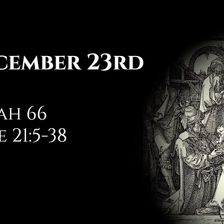
December 23rd: Isaiah 66 & Luke 21:5-38
Alastair Roberts
December 22, 2021
Zion gives birth to a new nation. The Olivet Discourse.
My reflections are searchable by Bible chapter here: https://audio.alastairadversaria.com/exp
More on OpenTheo

Did God Create Us So He Wouldn’t Be Alone?
#STRask
November 3, 2025
Questions about whether God created us so he wouldn’t be alone, what he had before us, and a comparison between the Muslim view of God and the Christi

Sense, Sensibility, and Adam Smith with Jan Van Vliet
Life and Books and Everything
February 16, 2026
This year is a special anniversary for the United States as Americans celebrate 250 years of independence. But 1776 was an important year in more ways

An Invitation to the 2026 Coram Deo Pastors Conference
Life and Books and Everything
February 18, 2026
"I love being a pastor, and I love pastors, which is why I hope you will consider joining us at the Coram Deo Pastors Conference in 2026." —Kevin DeYo

How Do I Determine Which Topics at Work Are Worth Commenting On?
#STRask
January 5, 2026
Questions about how to determine which topics at work are worth commenting on, and a good way to respond when you’re in a group Bible study and hear e

When I Can’t Stop Thinking About Something, Is That God Speaking?
#STRask
December 1, 2025
Questions about whether having a recurring thought is an indication God is speaking to you, what to say to someone who says they sinned because “God t

How Do You Justify Calling Jesus the Messiah?
#STRask
December 18, 2025
Questions about how one can justify calling Jesus the Messiah when he didn’t fulfill the Hebrew messianic prophecies, and whether the reason for the v

Why Would Any Rational Person Have to Use Any Religious Book?
#STRask
December 8, 2025
Questions about why any rational person would have to use any religious book, whether apologetics would be redundant if there were actually a good, un

Life and Ministry in Charlotte and in the SBC with Clint Pressley
Life and Books and Everything
December 15, 2025
In a rare cultural anomaly that may never be repeated in our lifetimes, the current SBC President and current PCA Moderator live in the same neighborh

The Heidelberg Catechism with R. Scott Clark
Life and Books and Everything
November 3, 2025
You may not think you need 1,000 pages on the Heidelberg Catechism, but you do! R. Scott Clark, professor at Westminster Seminary California, has writ

Can Two Logical People Come to Conflicting Conclusions Without Committing a Fallacy?
#STRask
January 8, 2026
Questions about whether two logical people can come to conflicting conclusions on a topic without committing a fallacy, how Greg, as a public figure,

Conservatism and Religious Freedom with John Wilsey
Life and Books and Everything
October 27, 2025
What is conservatism? And why does it go hand in hand with religious freedom? How should we think about the American experiment of ordered liberty? Ha

Why Does the Bible Teach You How to Be a Proper Slave Owner?
#STRask
November 13, 2025
Question about why it seems like the Bible teaches you how to be a proper slave owner rather than than saying, “Stop it. Give them freedom.”
* It s

Does God Hear the Prayers of Non-Believers?
#STRask
February 26, 2026
Questions about whether or not God hears and answers the prayers of non-believers, and thoughts about a church sign that reads (as if from God), “Just

Lora Ries: Border Security and Immigration Policy
Knight & Rose Show
December 7, 2025
Wintery Knight and Desert Rose welcome Lora Ries to discuss border security and immigration policy. They explore Biden's policy changes, like ending R

How Would You Convince Someone That Evil Exists?
#STRask
November 17, 2025
Questions about how to convince someone that evil exists, whether Charlie Kirk’s murder was part of God’s plan, whether that would mean the murderer d
